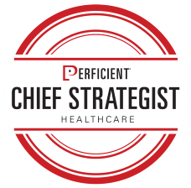In the realm of healthcare, artificial intelligence (AI) and cognitive computing continue to gain momentum, and they have the potential to revolutionize healthcare.
In fact, Forrester predicts that 70% of enterprises are anticipated to implement AI in 2018. Furthermore, 25% of enterprises are predicted to supplement point-and-click analytics with conversational interfaces. This growth means that delivering successive visualizations in real time will soon become standard features of diagnostic applications.
Of these enterprises, 20% will position AI to make decisions and deliver real-time instructions. As a result, AI will advise what to offer consumers and patients, endorse terms given to suppliers, and educate employees on what to say and do in real time.
With the assistance of AI and augmented reality technology, computer-generated images of data can provide a holistic patient view. With this view, healthcare practitioners have access to in-depth, detailed imagine with which to to conduct patient evaluations.
AI and Cognitive Computing in Action
Memorial Sloan Kettering (MSK), the world’s oldest and largest private cancer center, has collected, stored, and curated reams of data on cancer patients and treatments used over many decades. In a recent partnership with IBM Watson, MSK has been training Watson to understand this data, as well as apply it to a corpus of real-world evidence and millions of medical journals, and research findings, to suggest the optimal care pathways for a cancer patient.
MSK is now able to present and recommend treatment ideas or options to doctors based on what has worked best in the past.
Other health systems and oncology practices can now avail themselves of these same capabilities through Watson for Oncology, an IBM cognitive platform that uses millions of data points to provide evidence-based cancer care to patients.
Augmented reality can bring 3-D images to life with practical applications in healthcare. 3-D printing can enhance the provider’s application in healthcare and improve the patient’s experience.
Zebra Medical Vision is one company that is pioneering this shift with its medical image analytics platform, which creates AI algorithms to read medical images and detect anything problematic before humans can.
Visual aspects of artificial intelligence can add more dependability to a physician’s diagnosis, with the help of pattern recognition systems in medical care facilities. Visual recognition software can store and compare images across the spectrum of diseases and care techniques, to develop an accurate diagnosis in partnership with the working physician.
AI and cognitive computing solutions can evoke evidence-based approaches programmed by researchers and clinicians. For example, The Permanente Medical Group developed a predictive analytics model that can identify which hospitalized patients are most likely to end up in the ICU tomorrow. The system can continuously monitor the health status of all hospitalized patients, and notify physicians whenever a patient is deemed at risk.
When practitioners insert known statistics into smart algorithms, computers can extract information and relate it to a problem. With this predictive information, practitioners can intervene in advance of a major complication and have the opportunity to save more lives each year. Reducing emergency and ICU admissions also has the potential to decrease healthcare costs.
Currently, chatbots are providing patient assistance and care, including providing users with access to their medical records and information, all while streamlining the data exchange process at the first sign of illness. Chatbots also allow healthcare plans to field a variety of requests that are traditionally managed by a call center staff, such as pre-authorizations, consumer questions while shopping for a plan, and member onboarding.
Conversa Health focuses on automating digital conversations between providers and patients. The company developed a program that features more than 50 clinically intelligent conversation programs that include conditions that typically require continuous observation and follow-up care, such as diabetes and hypertension.
The company’s technology automates the interactions that should take place between physicians and patients to enhance healthcare delivery and improve both clinical and financial outcomes.
AI-powered solutions can also help patients book appointments, monitor a patient’s health status, and perform other time-intensive activities healthcare organizations must perform, including inventory, billing, and claims management.
While the development of AI and cognitive computing technology are still in the beginning phases, the outlook is very promising. Successfully deploying AI solutions in healthcare can lead to greater efficiency and more cost-effective programs.
It is hard not to see the benefits of using data and technology, such as analytics, AI, cognitive computing, and the cloud to foster more efficient healthcare operations and to improve patient outcomes. The increasing amount of data produced is, in fact, a blessing, but for society to benefit from it requires investments.
Those investments are strategy and technology. Without either of these, healthcare organizations will find it increasingly challenging to serve their patients and members well, and remain profitable.
We recently published a guide that explores how data and technology can enable organizations to make informed healthcare decisions, produce better patient outcomes, and create a better patient and stakeholder experience. You can download it below.
This blog was co-authored by Tom Lennon.


